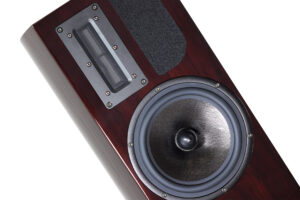Although laborious, this is a process that reveals the critical musical importance of the central grounding cone. Even replacing the adjusters with four of Track Audio’s excellent spikes couldn’t come close to matching the low-frequency clarity, pitch definition and transparency delivered by the single path ground, along with the focus and integration that instilled right up the musical range. Playing the title track from the Cure’s seminal album, Seventeen Seconds (Fiction FIX 004), the adjusters condensed and curtailed the bottom end, destroyed the pitch and purpose in the playing, muddying the mid-band and exposing and disconnecting the cymbal work. Switching to the four spikes helped firm things up and at least brought edges to the bass notes, but re-installing the central cone/stabiliser arrangement transformed the music, bringing a deliberate intent to the cleanly defined bass notes, snap to the snare and a reassuring thud to the previously muddy bass drum. The gently accelerating pace is perfectly captured, as is the pick up before the vocal entry. The jangly guitar and the previously irritating cymbal work are now correctly integrated and on point, the vocals direct and articulate. Where does that clarity and stability come from? From banishing the smear and clutter that comes from the energy that is stored in the cabinet and then released back into the drivers, energy that’s out of step and out of time with the notes and phrases in the music. In one sense, providing that energy with a direct exit path is astonishingly effective. In another, given the relative energy levels involved and just how effective mechanically grounding electronics can be, perhaps the only real surprise should be that more designers don’t adopt the approach.

This lack of spurious output and disruptive energy doesn’t just promote clarity: musically speaking it releases the brakes. Seventeen Seconds (the album rather than the track) takes on precisely the sort of nervous urgency and momentum it should, the music blending perfectly with the desolate semi-nihilism of the lyrics, allowing the self-deprecating sub-text to emerge. The sophisticated pop of Crowded House (Woodface – Capitol 7243 8 55668 1 3) is effortlessly unravelled, from the random cannonade of disparate sounds that opens ‘It’s Only Natural’ to the undulating swell of ‘Fall At Your Feet’, the Edena navigates the overlapping rhythms and layers without slowing or hesitation. But it’s acoustic recordings that reveal the Edena’s strengths. Play the title track from Time (The Revelator) – (Gillian Welch, Acony 0103) and right from the almost visual sense the incidental sounds give to the musicians settling, there are a presence and palpability to the performance that belies the modest price of (and seems utterly independent from) the speakers. The separation of the guitars, the attack in David Rawlings’ plucking, the cut and thrust of the musical conversation, the slow dynamic escalation across the track and the emphatic vocal diction are vividly realised.

